
The Free Press

On today’s Front Page from The Free Press: Why history won’t remember Trump’s shooter. . . Kamala Harris shouldn’t have bailed on Bibi. . . What to watch for at the Olympics. . . The media memory-holes Kamala the ‘border czar.’
But first, the president’s speech.
Dropping out might be the most popular thing Joe Biden does as president. A new CNN survey finds that nearly nine in ten registered voters approve of his decision not to seek a second term. And last night, the president addressed the nation for the first time since he announced his decision Sunday on X.
Biden said that he had “decided the best way forward is to pass the torch to a new generation” but did not address the question of his age head on. Instead, he said that it had become clear to him that “I need to unite my party.” In stepping aside, he was putting “our democracy” over his personal ambition.
Biden read his speech in the unsteady, unclear manner we have come to expect from the 81-year-old president and undoubtedly left Democrats watching with little regret about their decision to dump him for Kamala Harris. But he suggested he would have an energetic lame-duck period, listing curing cancer, ending the war in Gaza, and Supreme Court “reform” as items on his to-do list between now and January. That ought to keep him busy. Here’s hoping China doesn’t have other plans.
Last week, it was considered common knowledge that Kamala Harris’s purview as vice president included the southern border. It’s why, in 2021, The New York Times referred to her as Mr. Biden’s border czar.
That was then. Before Kamala Harris was running for president. As of the past 48 hours, this fact has now been reclassified by the press as disinformation. Why? Because it’s been deemed politically unhelpful. And so it has to be memory-holed. Peter Savodnik has the (outrageous) story:
On March 24, 2021, Axios published a story with the headline “Biden Puts Harris in Charge of Border Crisis.”
Politics reporter Stef W. Kight informed us that the vice president would be “addressing the migrant surge at the U.S.-Mexico border,” and that Harris would “lead efforts with Mexico and the Northern Triangle (Guatemala, Honduras and El Salvador) to manage the flow of unaccompanied children and migrant families arriving at the border in numbers not seen since a surge in 2019.”
Lest anyone wonder whether this was a big job with a great deal of responsibility, a White House official told reporters: “President Biden said during the transition, whatever the most urgent need, he would turn to the vice president, and today he is turning to the vice president.”
Today—July 24, 2024—the same reporter at the same outlet has a story headlined “Harris Border Confusion Haunts Her New Campaign.”
Kight now reports: “In early 2021, President Biden enlisted Vice President Kamala Harris to help with a slice of the migration issue.” (Emphasis mine.)
We are told that there is “confusion around the VP’s exact role” and that “early media misfires and the rapidly changing regional migration crisis has made the issue a top target for the GOP trying to define their new opponent. And it has become even more critical for Harris to find a clear border message, fast.” The story also quotes former Department of Homeland Security secretary Jeh Johnson: “She is not the border czar.”
Just to make sure readers understand that Axios, in 2021, in no way intended to provide Republicans, in 2024, with a talking point that might help Donald Trump, Axios has added an editor’s note at the bottom of the new piece: “This article has been updated and clarified to note that Axios was among the news outlets that incorrectly labeled Harris a ‘border czar’ in 2021.”
Read on for more from Peter on the manufactured confusion around Kamala’s border role.
In a joint session of Congress, Israeli prime minister Benjamin Netanyahu described his nation’s war with Hamas as “not a clash of civilizations” but “a clash between barbarism and civilization” that “we will win.” (Times of Israel)
The KHive is apparently full of Bernie Bros. Fans of the octogenarian self-described democratic socialist are reportedly enjoying the rise of Kamala. That might be good for Democratic party unity, but it hardly screams “setting out your stall as a moderate to win in November.” (Politico)
Kamala Harris’s investment portfolio is “dull,” according to The Wall Street Journal, with Harris and her husband, Doug Emhoff, keeping “much of their money in plain-vanilla index funds—with a fair amount in cash.” Dull is what I want in a presidential candidate’s finances (a happy contrast to either Trump or Biden’s financial affairs). The Journal estimates Harris and Emhoff have a net worth between $3.6 million and $7.36 million, plus real estate. (WSJ)
Ten percent of Cuba’s population left the island between 2022 and 2023. It is the biggest migration wave in Cuban history and sign of a failing Communist country. Will the death of Raúl Castro, now age 93, be the final nail in the regime’s coffin? (Marginal Revolution)
The U.S. is on track this year to run the largest deficit in its history, aside from in a crisis like war or a pandemic. In an election year, both parties are eager to blame the other side, but neither is getting serious about balancing the books. (Bloomberg)
After half a century in politics, Senator Bob Menendez, found guilty of all 16 counts in his corruption trial, will resign, effective August 20. Why then? Well, as Katherine Tully-McManus notes, senators get paid on the 5th and 20th of each month. Trust old “Gold Bar Bob” to check out after payday. (Politico)
Democrats might be happy to have a shiny new presidential candidate, but veteran strategist James Carville warned against overconfidence Wednesday. “That excitement’s gotta be tempered with realism, and the realism is, she has a tough campaign to run,” he said on Morning Joe. (MSNBC)
The worst thing about growing intolerance on college campuses is the insidious way it drives the best people out of academia. That’s the argument of an anonymous academic who writes about the demoralization crisis in higher ed. (Konstantin Kisin)
Plenty has been written about the damage smartphones have done to kids. But maybe the real “anxious generation” are the parents. Lenore Skenazy, founder of the Free-Range Kids movement, argues that phones stop parents from trusting their children: “Once we have the ability to watch, assist, and reassure from afar at any moment, it changes our parental role.” (After Babel)
Filming for FBI: Most Wanted at Queen’s College was interrupted by an anti-Israel demonstration this week. The episode reportedly involves a climate change activist encampment on campus, so the protesters were staging a protest of a staged protest. (Guardian)
Secret Service chief Kimberly Cheatle resigned on Tuesday after a disastrous congressional hearing about the shocking lapses that led to the near assassination of Donald Trump. Yesterday, it was FBI director Christopher Wray’s turn in the hot seat.
Wray was more forthcoming than Cheatle with the facts about what he called an “attack on our democracy.” He promised to “leave no stone unturned” in his agency’s investigation and told Congress that Trump’s near assassin was a “loner” with few phone contacts, who most likely acted alone. The shooter “appears to have done a lot of searches” for “public figures.” But a week before the rally, he became “very focused” on Trump, Wray said.
On July 6, the shooter googled “how far away was Oswald from Kennedy?” and registered for the Trump rally. On July 12, he visited a shooting range where he “probably” fired a gun similar to the one he used the next day. On July 13, two hours before he would attempt to kill Trump, he flew a drone over the rally site. The FBI recovered the shooter’s drone as well as three “relatively crude” explosive devices capable of remote denotation.
The FBI may be “digging hard,” for more details of a clear motive, but, as Kat Rosenfield notes in her piece for us today, 20-year-old Thomas Matthew Crooks has faded from the conversation of the near death of a former president with remarkable speed. Why? Read on. . .
On this week’s letters page, Kat Rosenfield fields readers’ culture recommendations, a former marine explains why Trump’s response to his near assassination doesn’t give him “moral authority,” and readers respond to Elias Wachtel’s account of walking to the Appalachian Trail. Read all the letters here.
→ Hate in Washington: On Wednesday evening, I got off the train from New York to Washington, D.C., and walked through Union Station’s grand main hall and out its doors to be greeted by Columbus Fountain covered in hateful graffiti. The largest slogan read “HAMAS IS COMIN” beneath an upside down triangle—the symbol used by the terrorist group to signify targets for attack. This is what Washington, D.C., looks like when Israel’s prime minister is in town.
There were a few protesters milling about in keffiyehs when I left the station. But a few hours earlier, a mob at the scene had pulled down and burned an American flag, raising a Palestinian one in its place. When one man tried to rescue a burning American flag, he was chased by protesters. Footage also shows protesters attacking Park Police officers. The police arrested and charged two people with assaulting a police officer.
The disorder on Washington’s streets made Netanyahu’s point for him. In his address to Congress yesterday afternoon, he argued that Israel’s enemies were America’s enemies. Outside Union Station, a stone’s throw from the Capitol where he was speaking, the stars and stripes were in flames, set alight by radicals who hate not just the Jewish state, but America too. —OW
→ Kamala’s first stumble: When Israeli prime minister Benjamin Netanyahu addressed a joint session of Congress on Wednesday, his fourth such speech, the new leader of the Democratic Party was missing. Vice President Kamala Harris, who was busy delivering an address to the Zeta Phi Beta sorority’s Grand Boulé in Indianapolis.
In normal times, Harris’s snub of Bibi would be expected. Democrats still sting from Netanyahu’s campaign in 2015 against former president Barack Obama’s nuclear deal. When Netanyahu spoke before a joint session that year to make his case, many Democrats boycotted. Things have only gone downhill since then: Bibi’s relationship with Biden has been strained in recent months; Senator Chuck Schumer blasted Bibi from the House floor in March; the Squad, along with lots of left-wing activists and many Arab American groups, have decried Israel’s war in Gaza as a “genocide.”
But Harris effectively won her party’s nomination within 24 hours of Biden’s announcement Sunday that he would not seek reelection. In other words: she does not need to please the anti-Israel base of her party in order to win a primary.
Instead, what Harris needs to do is spend the precious 100 days before the election defining herself before the nation. Simply sitting behind the rostrum as the leader of the Jewish state delivered a stirring address about how his country’s enemies were also America’s would have neutralized the Trump campaign’s efforts to paint the vice president as a San Francisco socialist who is out of touch with everyday people.
“Nobody knows where Kamala Harris stands on Israel,” former GOP foreign policy adviser Dan Senor told The Free Press. “She’s a blank slate. This was a high-profile opportunity to define herself on this issue, and she took a pass.”
Meantime, roughly half of congressional Democrats proudly boycotted. Rep. Rashida Tlaib (D-MI) attended with a sign that read “War Criminal.” Nancy Pelosi posted on X that Bibi’s speech was the “worst presentation of a foreign dignitary” to ever address Congress.
One wonders if the former House speaker noticed what was happening outside. Half a mile from where the prime minister was speaking, radicals and Park Police clashed at Union Station as some vandals replaced the American flags with Palestinian ones. Earlier in the week, the Palestinian Youth Movement claimed credit for releasing crickets and maggots at the Watergate Hotel where Netanyahu and his team were staying.
Kamala’s absence from the chaos has left her open to attacks. On Tuesday, House Speaker Mike Johnson said at a press conference, “Madam Vice President, you say you want to be the leader of the free world, and yet you can’t bring yourself to sit behind our most important and strategic ally in this moment.” —Eli Lake
→ Is Trump having buyer’s remorse over J.D. Vance? On Monday, Trump sat down with his running mate for their first joint interview. Fox’s Jesse Watters noted J.D. Vance had “beat out a lot of impressive people” for the VP nomination. “Very impressive people,” Vance replied, nodding. Trump said he and the senator from Ohio had “automatic chemistry.”
But behind the scenes, Trump might be having buyer’s remorse over his new veep pick.
Outwardly, the Trump campaign insists they are still the “perfect team.” But on X, Atlantic writer Tim Alberta reports that some Trump allies have been “second-guessing” the choice of Vance, acknowledging the selection was “borne of cockiness, meant to run up margins with the base in a blowout rather than persuade swing voters in a nail-biter.”
That strategy worked when Trump was facing off with 81-year-old Biden. Now that fresh-faced Kamala Harris, 59, is at the top of the ticket, the race is suddenly a lot more competitive. Two polls taken after Biden dropped out and endorsed Harris found she is neck and neck with Trump in the presidential race. And having another white male who speaks fluent Rust Belt MAGA on the ticket doesn’t give Trump any important advantages.
GOP strategist Tricia McLaughlin acknowledged this problem even before Biden bowed out. “J.D. Vance just doubles down on what Donald Trump already has,” McLaughlin told The Free Press at the RNC. Trump “already has those factions,” and Vance “might energize that base more, but they’re already pretty energized.”
Less than a week ago, conservatives were excited to see Vance, the 39-year-old author of Hillbilly Elegy, “wipe the floor” with Harris in a debate. But in securing the number one slot, Harris will have the opportunity to handpick her own Vance-mopper. One possibility is Kentucky governor Andy Beshear who has already attacked Vance as a “phony” with “no convictions.” Another is Pennsylvania governor Josh Shapiro, who is noted for his oratory skills.
Harris’s ascent to the top of the ticket also brings Vance’s vulnerabilities into sharp focus.
First, there’s abortion. Harris is expected to make abortion access a key line of attack in her campaign against Trump. And while Trump is trying to steer the GOP toward a more popular stance on the issue (legal, but with restrictions), Vance, a recent Catholic convert, has taken a much more uncompromising approach. During a January 2022 podcast, Vance said he “would like abortion to be illegal nationally.” And up until last week when he was chosen as Trump’s VP, he called himself “100 percent pro-life” on his campaign website and coupled that with an endorsement of Ohio’s six-week ban under the headline “End Abortion.”
And while all politicians are guilty of changing their minds, Vance is in the uncomfortable position of having routinely criticized his own running mate. Back in 2016, he mused that Trump might be “America’s Hitler,” and that the MAGA leader was “leading the white working class to a very dark place.”
Finally, Trump and Vance aren’t as politically aligned as they might appear. Last month, after the Heritage Foundation prepared a policy blueprint for a second Trump term, called Project 2025, Trump disowned it, saying he had “nothing to do” with the people behind it and that some of its contents were “ridiculous and abysmal.”
But guess who is a fan of the people behind it? A clue can be found in the new book penned by Project 2025 captain Kevin Roberts. Entitled Dawn’s Early Light: Taking Back Washington to Save America, it outlines a peaceful second revolution for American voters.
The person who wrote the foreword is none other than J.D. Vance, who is full of praise for the author: “Never before has a figure with Roberts’s depth and stature within the American Right tried to articulate a genuinely new future for conservatism,” Vance writes. “We are now all realizing that it’s time to circle the wagons and load the muskets. In the fights that lay ahead, these ideas are an essential weapon.” Oops. —Madeleine Kearns
With the avalanche of news over the past few weeks, you could be forgiven for forgetting that the Olympics are upon us! Tomorrow night’s opening ceremony will kick off 16 days of competition. As Team USA tries to crush the competition, Evan Gardner will be your daily Free Press guide to the best from the games. Today he kicks things off with a preview that includes the Seine’s murky waters, the Japanese gymnast sent home for smoking a cigarette, and the Canadian soccer coaches using drones to cheat. Over to you, Evan.
→ Troubled waters: The opening ceremonies haven’t even begun, and there’s already high drama in Paris. This year’s Olympic marathon and triathlon swimming events are set to take place in the Seine, which sounds lovely. Except for the E. coli thing. Just two weeks ago, The Athletic reported that the river is filled with dangerous bacteria. To prove just how safe and effective the water is, Parisian mayor Anne Hidalgo bravely donned her wetsuit and went for a dip.
But while the jury’s out on whether the long-distance swimmers will brave the Seine, the hammer has already come down for a few competitors who made it all the way to Paris just to be sent home.
First up, the Japanese gymnastics team sent one of their athletes packing for smoking a cigarette. She’s 19, and the legal smoking age in Japan is 20. Surely there must be an exception for being a teenager in Paris?
Also on a plane home: a coach and an analyst working for the Canadian women’s soccer team who were caught flying drones over New Zealand’s practices. And then, there’s the dressage (it’s an equestrian thing, doesn’t have to do with skirts) champion Charlotte Dujardin who suspended herself from Great Britain’s team after a video came out of her whipping a horse on the legs. The three-time Olympian wrote, “I am deeply ashamed and should have set a better example in that moment.”
→ Let the games begin: If you can peel yourself away from the Kamala-Trump drama, there’s a ton to look forward to in the coming days. On Saturday morning, Argentina will be taking on Australia in field hockey. The Aussie team is led by Matt Dawson, a man who opted to cut off part of his finger after breaking it, lest he miss the Olympics. On Sunday, the U.S. men’s basketball team will play their Olympic opener, taking on Serbia, led by three-time NBA MVP Nikola Jokic. For those who think U.S. dominance will be a cakewalk, think again. They won by one point in an exhibition match earlier this week against South Sudan—a nation that has existed for only 13 years, and has zero indoor basketball courts.
Between games, I recommend reading about the regular Joes heading to Paris as clock punchers and Noah Lyles, America’s fastest man who has the word “ICON” tattooed on his abs.
→ Remembering Walter Shapiro: It was 11:00 a.m. on Sunday, just hours before President Joe Biden announced he was ending his reelection bid, that I got the email telling me that Walter Shapiro had died. Until five days earlier, when he went into the hospital with an infection related to a recent bout of cancer, Walter had been covering the Biden-Trump presidential race—his twelfth!—for The New Republic and Roll Call.
In the appreciations that followed his death, Walter was described as one of the great political reporters of the age. That was no overstatement. “Cutting without being snarky, and sincere without being corny,” wrote his friend Matthew Cooper in The New Republic. Jason Dick, the editor of Roll Call, called him “a pro’s pro.” In The Washington Monthly, where Walter got his start in political journalism, James Fallows wrote a piece encapsulated by its headline: “The Reporter Who Made Us Love Politics—or Tried.” Walter’s writing was funny and insightful, but it was also fair. To my mind, that’s what set Walter’s political journalism apart from so much of today’s partisan punditry.
Walter had stints with a dozen publications or more: Time and Esquire and USA Today and Salon among them. Perhaps that’s why he wasn’t better known—I’ve long thought that if he had stayed at one publication for the bulk of his career, he might have been revered the same way that, say, David Broder was. The political cognoscenti, though, knew how good Walter was, and they did indeed revere him.
I knew Walter primarily as an alum of The Washington Monthly, a magazine where I worked a few years after he had left. I saw him often during my time at the Monthly, but I was never the political junkie he was, and once I left the capital, we met up only sporadically. But I always made it a point to read his stories, and once, in New York, I watched him perform his stand-up comedy act, a little sideline he greatly enjoyed.
At the age of 77, Walter was covering the Biden-Trump race with the same verve as he had decades earlier. Here, for instance, is a paragraph from his penultimate story in The New Republic, about the cowardice of the Democrats:
“Since Thursday night, Democratic elected officials have been turning to friendly pundits and commentators with the cheering-squad words, ‘You go first.’ In World War II terms, top Democrats are implicitly suggesting that, of course, they want to storm the beaches at Normandy, but they are inclined to wait until the sixth wave of invasion boats when the seas grow calmer and the fusillades of bullets have diminished.”
With Biden stepping aside for Kamala Harris, the next 102 days are going to be some of the most exciting and important in American history. Walter would have told the story of those 102 days as well as or better than anybody. It hurts that he is no longer with us to tell it. —Joe Nocera
Oliver Wiseman is a writer and editor for The Free Press. Follow him on X @ollywiseman.
To support The Free Press, become a paid subscriber today:
And if you’re enjoying The Front Page, consider forwarding it to someone else you think might like it.

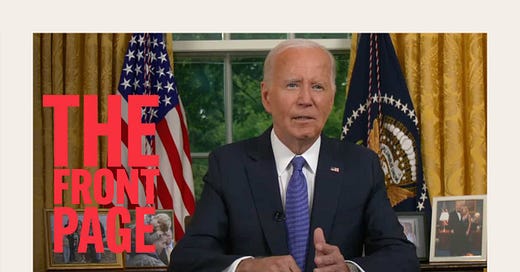



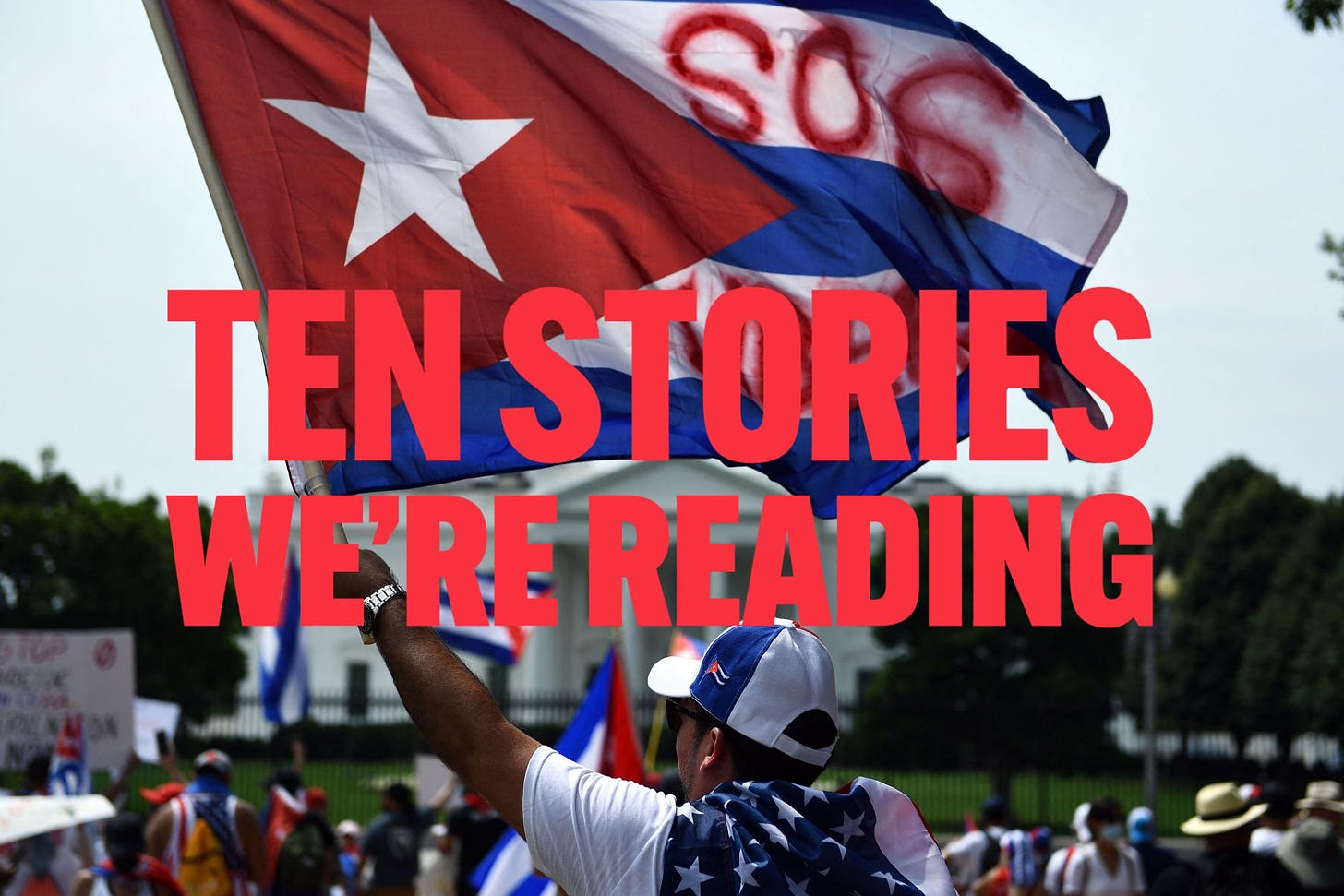



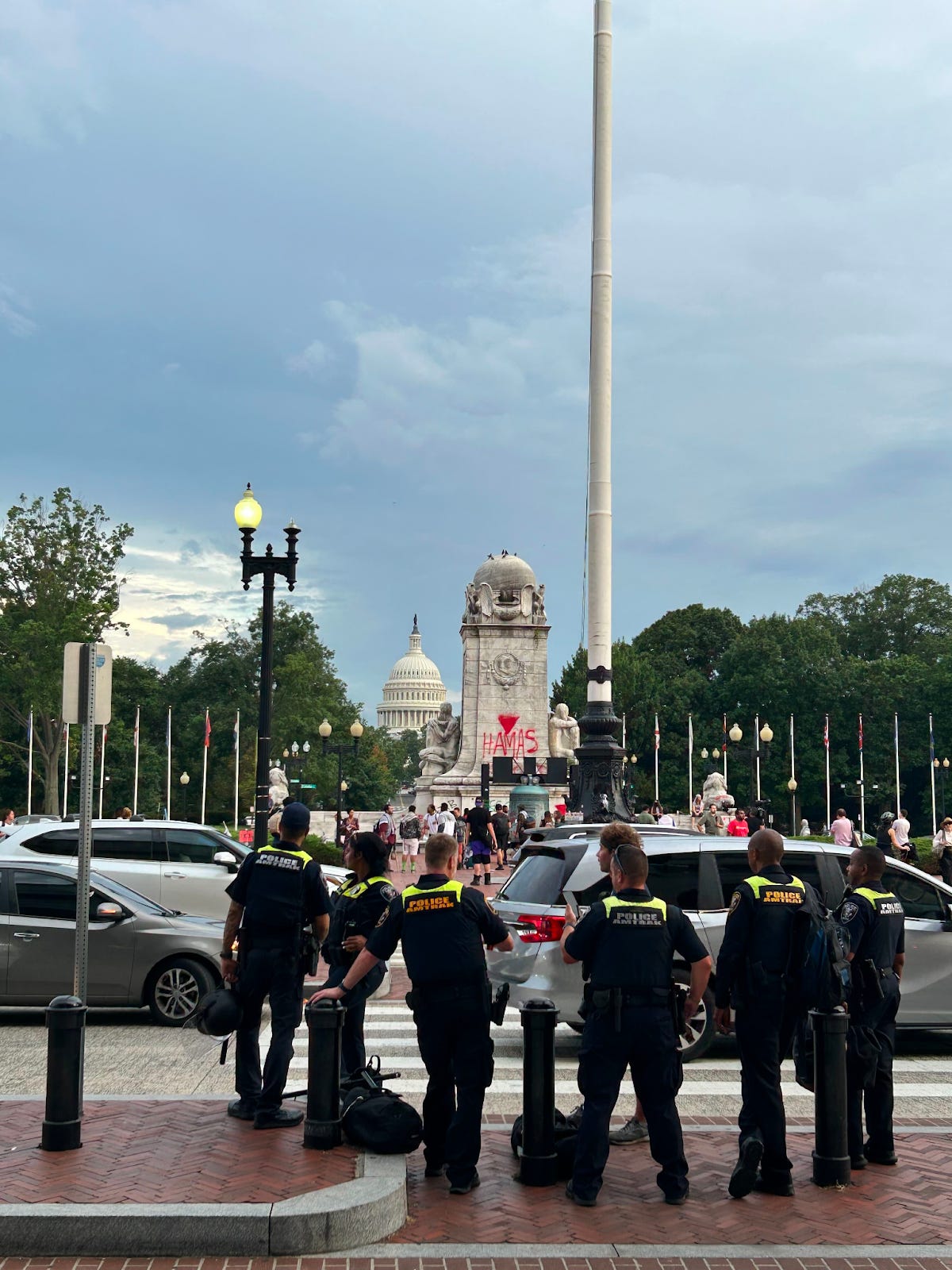






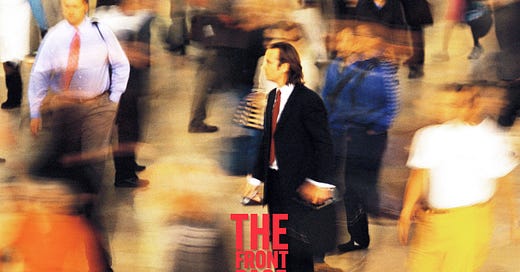

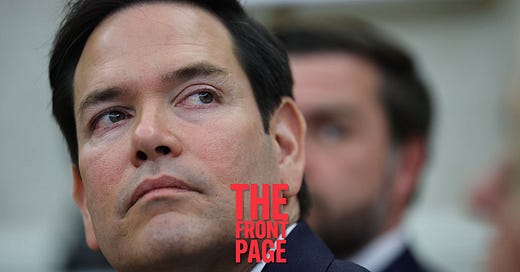




oliver, Marine is capitalized here in the US. It is well earned.
Everyone knows where Kamala stands on Isreal, except maybe journalists and political commentators.